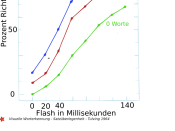AbstractThe main aim of this study is to see 'how learning is affected by memory processes in primary school children.' Craik and Lockhart level of processing study on memory suggests that the more a word is processed, the more probable it is that it will be remembered. They believed rehearsal is not sufficient as it is the cognitive processes that are important.
This theory will be tested by giving primary school children various tests that require different levels of processing. The children will be presented with 10 words. They will then be asked a question for each word where the answer is yes or no. Questions will be of three types; shallow processing (in terms of case recognition whether lower or upper) phonetic processing (in terms of rhyme) and semantic processing (in terms of meaning). They will then be given 40 seconds to recall as many of the words that they can.
The belief that elaboration can lead to greater recall will be tested by using an expected (intentional learning) and unexpected (incidental learning) test of recall.
The findings showed that semantic words were recalled best and phonemic words were recalled second best in both the expected and unexpected tests of recall. In conclusion the findings show that learning is affected by the memory processes of children as the children were tested for recall semantically; if they were tested for recall phonemically then phonemic words may have been recalled best.
Introduction,Memory is one of the earliest areas to be studied in psychology. Craik and Lockhart (1972) found that people were able to remember words without recall. They believed it's the processes that occur at the time of storing data that determines how something is remembered. They suggest that it is elaboration that creates a long lasting memory.
This was tested...


